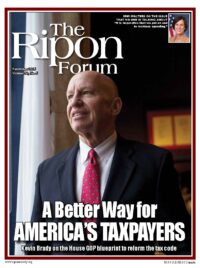 On the political stump and in the media, trade agreements have been blamed for killing American manufacturing, stealing jobs, widening income inequality, degrading the environment – even causing cancer. Much of the ire has been directed at the Trans-Pacific Partnership, a trade agreement signed earlier this year by the United States and 11 other Pacific-Rim countries on four continents. Although not a perfect agreement, the TPP is a good deal for American consumers, workers, and businesses, and its ratification by Congress is crucial to protecting U.S. economic and geostrategic interests going forward.
On the political stump and in the media, trade agreements have been blamed for killing American manufacturing, stealing jobs, widening income inequality, degrading the environment – even causing cancer. Much of the ire has been directed at the Trans-Pacific Partnership, a trade agreement signed earlier this year by the United States and 11 other Pacific-Rim countries on four continents. Although not a perfect agreement, the TPP is a good deal for American consumers, workers, and businesses, and its ratification by Congress is crucial to protecting U.S. economic and geostrategic interests going forward.
In terms of economic heft, the TPP is the largest U.S. trade agreement ever negotiated. In 2014, its 12 signatories accounted for 23 percent of the world’s exports and 36 percent of global GDP. If implemented, the deal would eliminate tariffs on 90 percent of regional trade immediately, open growing Asian services markets to U.S. providers, prohibit customs duties on electronic commerce, expand Americans’ access to imported goods and services, and reinforce the institutional architecture that has enabled the rules-based, global trading system to flourish under U.S. leadership since the end of World War II.
Although not a perfect agreement, the TPP is a good deal for American consumers, workers, and businesses.
The agreement’s 30 chapters deal with tariffs and other traditional market access issues, but also include rules governing certain aspects of e-commerce, operations of state-owned enterprises, intellectual property and labor laws, environmental rules, and other areas that are less obviously associated with trade or trade barriers. Arguably, these governance provisions belong in trade agreements because domestic laws and regulations could have protectionist intent or consequences, but their inclusion also raises concerns about the potential for overreaching that could erode national sovereignty and weaken domestic accountability. Accordingly, the usual anti-trade arguments from labor, environmental, and other groups on the left have been supplemented by free-market oriented assertions that the TPP is too much about global governance and too little about market liberalization.
Suspecting that the agreement was a mixed bag, scholars at the Cato Institute conducted a chapter-by-chapter, provision-by-provision assessment and concluded that – like most trade deals – the TPP augments our economic freedoms, but also includes some baked-in protectionism. However, as a whole package, the pros outweigh the cons and free traders should be supportive of ratification. Of the 22 chapters that were assessed and assigned scores (on a scale of 0 to 10), 15 were determined to be trade liberalizing (scores above 5), five were found to be protectionist (scores below 5), and two were determined to be neutral (scores of 5).
Economic studies from the U.S. International Trade Commission and the Peterson Institute for International Economics both found that the TPP would generate modest – but positive – increases in U.S. incomes. However, those estimates do not account for the fact that the TPP is a “living agreement,” open to new countries that can meet the relatively rigorous obligations of membership. This dynamic feature means that the TPP has greater upside potential than the estimates suggest, and makes the agreement a candidate to fill the void created by the breakdown of the consensus-dependent, multilateral negotiating “round” approach that undergirded global trade liberalization for a half century.
With 36 percent of global GDP represented by its charter members, the TPP already has achieved critical mass. Several countries already have expressed interest in joining the agreement. As membership increases, the cost of remaining outside the TPP will rise, as preferences, supply chains, and investments shift from TPP outsiders to TPP members. With its neighbors and most important trade partners joining TPP, Beijing will have no better alternative than to embrace it, as well, and accept the new rules that will rein in some of the abusive trade practices of which China is so frequently accused.
Economic studies from the U.S. International Trade Commission and the Peterson Institute for International Economics both found that the TPP would generate modest – but positive – increases in U.S. incomes.
The TPP is a crucial step in the process of reestablishing the primacy of non-discrimination and other tenets of the U.S.-led, post-WWII liberal economic order. It is a blueprint for securing U.S. geoeconomic and geopolitical interests now and into the future by reinvigorating the rules of international trade law and accommodating those institutions to a multi-polar, 21st century global economy.
But one major hurdle remains – Congress has not yet ratified the TPP, and prospects for doing so are extremely limited. The politics behind the fate of the TPP are more fluid than this suggests, but Congress will either consider implementing legislation in the Lame Duck session – between November 14 and December 23 – or it won’t. Congressional Republican leadership has rejected the idea of a Lame Duck vote, claiming a lack of support for TPP.
Certainly, the vitriolic, anti-trade rhetoric that has cascaded from the top of the ticket opened up a fissure in the GOP over trade. But if the party expects to recover from this year and be taken seriously when it advocates free markets and economic liberalization, its leadership needs to deliver the TPP before Christmas.
If it doesn’t, the fate of the TPP will descend into deep uncertainty, determined by a president who claims to oppose the deal and a Congress in which both parties reject the merits of trade liberalization and U.S. global economic leadership.
Daniel Ikenson is director of the Cato Institute’s Herbert A. Stiefel Center for Trade Policy Studies.




